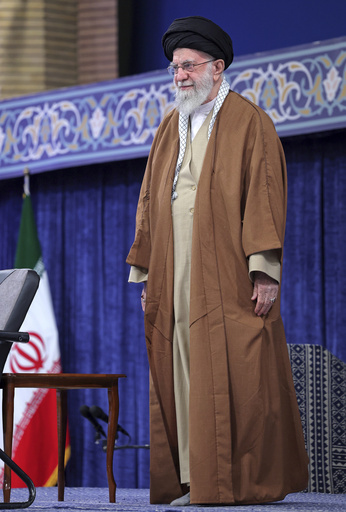
DUBAI, United Arab Emirates — On Friday, Iran’s supreme leader expressed skepticism regarding negotiations with the United States, labeling them as “neither intelligent nor honorable.” This statement comes in response to President Donald Trump’s suggestion of opening nuclear discussions with Tehran. Ayatollah Ali Khamenei also indicated his belief that engaging with the current U.S. administration was ill-advised but did not issue a definitive prohibition against such talks.
Khamenei’s comments disrupt several months of indications from Tehran that it was interested in negotiating its advancing nuclear program in exchange for relief from significant economic sanctions. The situation appears unclear moving forward, particularly since reformist President Masoud Pezeshkian had recently campaigned on a promise to pursue dialogue with Western nations.
During a speech to air force personnel in Tehran, Khamenei’s statements seemed to contradict his earlier comments made in August, where he appeared more open to negotiations. However, the 85-year-old leader has consistently navigated the complexities of discussing engagement with Western powers. He has aimed to harmonize the expectations of domestic reformists advocating for negotiations with the hard-line factions within Iran’s ruling clerics, such as the Revolutionary Guard.
Khamenei referenced Trump’s unilateral withdrawal from the previous nuclear agreement, which required Iran to significantly scale back its uranium enrichment and overall uranium stockpile in exchange for economic sanctions being lifted. “The Americans did not uphold their end of the deal,” Khamenei remarked. He pointed out that Trump’s administration had disregarded the prior agreement, stating, “The very person who is in office today tore up the agreement. He said he would, and he did.”
Highlighting lessons learned from past negotiations, Khamenei reflected on the concessions made, stating, “We negotiated, we gave concessions, we compromised—but we did not achieve the results we aimed for. Ultimately, the other side violated and destroyed the agreement.”
The motive behind Khamenei’s recent comments remains uncertain, although they surfaced following Trump’s expressions of a willingness to engage with Tehran, even as he reinstated a “maximum pressure” strategy on the nation. “I’m going to sign it, but hopefully we’re not going to have to use it very much,” Trump remarked from the Oval Office. “We will see whether or not we can arrange or work out a deal with Iran.”
Additionally, Trump stated, “We don’t want to be tough on Iran. We don’t want to be tough on anybody. But they just can’t have a nuclear bomb.” His commitment to a peaceful resolution was echoed in a message he shared online, where he called for a “Verified Nuclear Peace Agreement” that would allow for Iran’s development and prosperity, proposing a celebratory event once an agreement was finalized.
Khamenei’s comments are often indirect, allowing him to navigate sensitive topics without entrenching himself in a singular position. As the supreme leader, he has curated a complex political landscape rife with competition for influence among various factions, including civilian leadership under Pezeshkian.
Recently, Pezeshkian indicated a potential openness to increased inspections from the International Atomic Energy Agency. “They can come and inspect one hundred times more since we are not supposed to go after” a nuclear weapon, he noted in discussions with foreign diplomats. For years, Iranian officials have pointed to Khamenei’s previous statements, viewing them as a binding religious decree against the development of nuclear arms.
Iran maintains that its nuclear ambitions are purely peaceful; however, the country has been enriching uranium at 60% purity, just shy of the weapons-grade threshold of 90%. Iranian authorities have begun to suggest that pursuing an atomic bomb may be a possibility. U.S. intelligence views indicate while Iran has yet to kickstart a formal weapons program, it has engaged in actions that position it closer to developing a nuclear device if it chooses to do so.
In a broader commentary, Trump also mentioned that displaced Palestinians in Gaza could be permanently relocated and suggested U.S. involvement in redeveloping Gaza into a resort-like area akin to “the Riviera of the Middle East.” While Khamenei did not directly connect the two topics, he seemed to reference Trump’s remarks when he asserted, “The Americans sit, redrawing the map of the world—but only on paper, as it has no basis in reality.” Further emphasizing his stance, Khamenei warned that any threats from America would be met with responses from Iran aimed at preserving national security.

